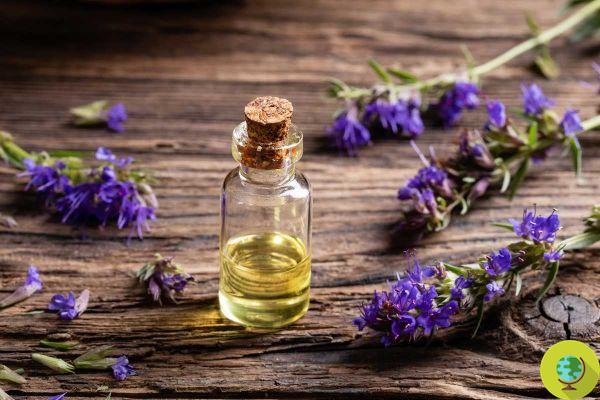
Hyssop is an evergreen medicinal plant used since ancient times. Let's find out all the uses, benefits and side effects.
Don't store avocado like this: it's dangerousDiscover all the uses and benefits of hyssop, a medicinal plant rich in polyphenol flavonoids used since ancient times for healing purposes
THEissopo it is a medicinal aromatic plant known since ancient times for its healing properties and used in the most common herbal preparations. It grows spontaneously in arid places, but it can also be grown in pots. It is characterized by having pointed leaves and flowers that form a sort of spikes, with intense and vibrant colors ranging from turquoise to purple.
Index
Hyssop - what is it?
Hyssop is one officinal and evergreen aromatic plant, whose botanical name is Hyssopus officinalis, which can derive both from the Greek “Hyssopos”, meaning “arrow-shaped” in reference to the particular shape of the leaves, and from the Hebrew “Esobh” which means “sacred herb”; historically, in fact, this plant was used since King Solomon for therapeutic purposes, to make fumigations to purify the environment and prevent diseases such as leprosy.
It is a shrub of the Lamiaceae family - like the a mint - native to southern Europe, the Middle East and the region surrounding the Caspian Sea. Due to its purported properties as an antiseptic, antitussive and expectorant, it has been used in traditional herbal medicine.
According to ancient beliefs, hyssop is able to ward off negativity and the evil eye. What characterizes it in addition to the leaves and the particular shape of the flowers, is the intense scent that recalls that of mint. Given its properties proven by science and the benefits for the body it is used in various herbal preparations, but also in the kitchen for the preparation of soups.
Properties and benefits
This aromatic plant has traditionally been used for medicinal purposes; in general, these therapeutic uses and health benefits of hyssop are largely based on folklore rather than scientific substantiation, although in recent years several studies have confirmed some properties related especially to the high concentration of flavonoids and polyphenols in oils. essential extracts from this plant which led to confirm in a review the antioxidant and antimicrobial properties, especially against Gram positive and negative bacteria, along with antiviral antifungal properties and insecticide. At the moment, however, these are in vitro studies conducted on animal models and human research is awaited to better understand However, human studies, adverse reactions and clinical trials examining the reported properties of hyssop are absent and require increased attention to determine whether biological differences in study results reflect different isolation procedures, different types of plant material used, harvest time,
Among confirmed therapeutic properties, we point out:
- property balsamic, expectorants and broncho-dilators, to promote the functionality and well-being of the airways.
- antioxidant properties, against free radicals
- antibacterial and antivirals capable of stimulating the immune system.
- purifying useful for treating skin problems, such as impure skin and acne.
- diuretic and antiseptic properties, which promote the well-being of the urinary tract, stimulate diuresis avoiding bacterial proliferation; useful and effective for example in case of cystitis.
- toning, which improve mood, counteract anxiety, stress, psychophysical fatigue and depression.
- property stimulants, tonic and eupeptic that improve digestion.
(Read also: Essential oils: why are they so effective?)
How is the hyssotope used
Hyssop can be used in several ways, as it is commercially available in the form of capsules, extracts, tablets and powders.
Here are some uses to enhance the benefits of hyssop:
- per infusions e decoctions from the balsamic action e broncodilatatrice; infusions of hyssop facilitate digestion and calm intestinal spasms. They are prepared with flowers and leaves that have benefits even in case of respiratory problems, in fact, for example decoctions of hyssop have effects antimucolytics, expectorants and cough suppressants.
- per wraps as they promote healing, soothe the skin and reduce swelling in case of sprains.
- like essential oil to relax body and mind. In this case, the advice is to use a few drops in a relaxing bath. Always in the form of oil it is effective against cough and phlegm: a few drops of hyssop oil are enough to be diluted in a glass of hot water and honey.
A medicinal plant with a thousand uses and properties, which in aromatherapy it is used to calm states of anxiety and emotional stress, but also as a tonic and muscle fatigue. (Read also: Ginger essential oil: the fantastic properties, uses and where to find it)
Contraindications and side effects
Hyssop can have contraindications and side effects, especially if you are hypersensitive to certain substances. In fact, the essential oil is composed of a ketone which can cause seizures and convulsions when taken in excessive doses.
It can also cause blisters, wheals, swelling of the tongue and breathing difficulties, in this case it is necessary to promptly contact your doctor. Hyssop is prohibited during lactation and pregnancy, because due to its emmenagogic properties, able to stimulate the menstrual flow, it can cause miscarriages.
- Follow us on Telegram|Instagram |Facebook |TikTok |Youtube
Could it be interesting for you:
- Essential oils: how to use them
- Ylang ylang essential oil: properties and how to use it
- Lemon essential oil: 10 ways to use it
- Sage: how to use it to feel better and for the beauty of skin and hair
- the recipe for jasmine oil
- Bronchitis: 5 balsamic herbs that help fight it
- Dandelion: properties, uses and contraindications


























